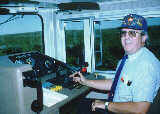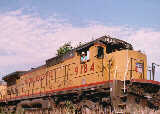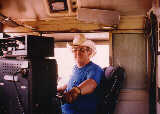|
Who Would Be Included In The Training
- Locomotive engineers (not previously employed as an engineer).
- Conductors and brakeman. (not previously employed as a conductor)
- Operating supervisors, VP,GM,TM, SLE and dispatchers if employed. Has knowledge of railroad operation.
- Locomotive and Car Repairman.
Re-Certification For Locomotive Engineers
- Day 1.... Operating rules, drugs and alcohol in the workplace. 6hrs.
- Day 1-2..Your Operating rules, Safety rules, FRA Laws. 6hrs.
- Day 2-3..The locomotive: Mechanical, Electrical. 14hrs.
- Day 4-5..The locomotive: Air brake and operation. 16hrs.
- Day 6.... Tests evaluations, Train handling. 8hrs.
Locomotive Engineers Currently Working As An Engineer
- Day 1...The Railroad: what it is and what it does. Computerized 8hrs.
- Day 2...The role of operating rules for this railroad. 8hrs.
- Day 3...The role of operating rules, Safety rules, FRA laws. 8hrs.
- Day 4...Safety rules, equipment and committee formation. 8hrs.
- Day 5...The locomotives on your railroad, construction. 8hrs.
- Day 6...Fundamental of Locomotive Air brakes. 8hrs.
- Day 7...Locomotive, diesel engine, governor, lube, fuel oil. 8hrs.
- Day 8...Locomotive, electrical, nomenclature, starting.
- Day 9...Battery, transition, load regulator, main generator controller and trouble shooting. 16hrs.
- Day 10..Final testing, evaluation and train handling. 8hrs.
- Day 11..Operation evaluation, safety and rules compliance. 8hrs.
Every 4 months spend one day, 4hrs, evaluating the person for a one year
period to satisfy the certification process. I don't know him, so I can
evaluate him/her in a fair manner.
Engineer To An SLE
- Day 1...Responsibilities & Management Training. The role of the SLE in the management of locomotive engineers. (Optional: The Railroad: What it is, what it does. Computerized)
- Day 2...Rules (safety), Operating, proficiency and evaluation tests, mechanical and train handling, final testing.
- Day 3...Ride and evaluate the new SLE. If passed, give new SLE his appointment letter.
Conductor-Brakeman Working As A Conductor
- Day 1...The Railroad: What it is and what it does. Computerized 8hrs.
- Day 2...Operating rules for the individual railroad . 8hrs.
- Day 3...Operating and Safety rules . 8hrs.
- Day 4...Safety equipment, forming a safety committee, FRA laws. 8hrs.
- Day 5...Locomotive and car equipment. 8hrs. Final test for the above.
- Day 6...Evaluation on the job. 4hrs.
Every six months one day: 4hrs of evaluation for Rules compliance and
safety audit. We see it differently than you do. You know the person,
we don't.
Operating Supervisors: VP, GM etc. Ex Railroad Professionals
Instructor to high rail or ride the complete railroad. One day or what it takes.
- Day 1...Operating Rules for the Railroad. 8hrs.
- Day 2...Opreating Rules, Safety rules, the Safety Committee. 8hrs.
- Day 3...Adopting and discussing operating and safety rules. 8hrs.
- Day 4...Special instructions, Employee timetable pro and con 4hrs.
- Day 4-5.Dispatcher, more than one train out at a time, bulletins, track warrant, operational suggestions, The FRA today. 12hrs
- Day 6...Road trip with instructor to put items discussed into effect. As long as it takes.
- Day 7...Locomotives of your railroad, construction, trucks, carbody, couplers draft gear mechanical, diesel engine 8hrs.
- Day 8...fuel, lube oil systems. cooling system, the governor. 8hrs.
- Day 9...Locomotive electric's, traction motors, main generator
- Day 10..Aux.gen., batteries, starting, load regulator, contactors relays, the controller and trouble shooting. 16hrs.
- Day 11..The locomotive and car air brake. review 8hrs.
- Day 12..AAR interchange rules and car construction. 8hrs.
- Day 13..Being a leader-supervising people. 8hrs.
- Day 14..The role of the hearing officer.
- Day 15..Investigations, Discipline and Procedures. 16hrs.
- Day 16..The union and the local chairman. 4hrs.
- Day 16..Locomotive operation and evaluation. 4hrs.
- Day 17..Locomotive operation and evaluation 8hrs.
- Day 18..Surprise testing and evaluations of your employees. Proper equipment. 4 hrs
- Day 19..Drug and Alcohol testing, tests taken. 4hrs.
- Day 20..Testing and evaluation review. 6hrs.
There can be some additions or subtractions as may be desired but this
class make up will speak for itself. Officers should be knowledgeable of
all the above. Enginemen and Conductors that have a railroad past do not
have to be told what a railroad is and what it does, so this is optional.
If The Railroad Has People Employed As:
- A....Locomotive electricians,machinists and helpers
- B....Carman
- C....Mechanical supervisors, CMO, Supt.of Motive Power, General Foreman, Foreman
- Day 1..The locomotives of your railroad. (optional) other locomotives.
- Day 2..Mechanical and electrical, The diesel engine, nomenclature fuel, lube and
cooling system, The turbocharger, the Woodward PG Governor,
load regulator and daily tests. 16hrs.
- Day 3..Locomotive Electrics, contactors-relays, main generator
- Day 4..Aux.Gen. wiring. Excitation, the controller, traction motors wheel slip
system (IDAC) optional GE Electric optional, batteries, controller and basic
electricity. Daily tests. 16hrs.
- Day 5..Optional. Head End Power. 8hrs.
- Day 6..The Locomotive Air Brake. (Not The Computerized Course) 8 hrs.
- Day 7..Carman and supervisors, Car construction. 8hrs.
- Day 8..AAR rules of interchange (for carman and supervisors) 8hrs.
- Day 9..Safety Rules, forming the Safety Committee, and proper equipment 8hrs.
- Day 10.Safety Audit of the property, final testing and evaluation of each man 8hrs.
- Day 11.Optional on the job evaluation of each man safety audit at least 4 hrs .. 8hrs per man or until he completes his duties.
Mechanical Supervision should attend all classes.
To make a Certified Locomotive Engineer from a person with no experience
it will take at least 90 days of classroom and on the job training.
After training, the person will be a Locomotive Engineer on paper only. In
practice, a Locomotive Engineer makes decisions, the right ones! But how
does he learn how to make these decisions without experience? Experience
and evaluations and time will tell. Read the FRA final rule for advice on
certifying Locomotive Engineers. The Locomotive Engineer has to have
complete knowledge of the following:
- Operating rules and Timetable Special Instructions.
- Safety rules.
- Knowledge of mechanical, electrical and air brake equipment.
- Physical Characteristics of his railroad.
- Train Handling one car or one hundred.
- FRA Rules.
- Handling hazardous materials.
- Be able to pass tests and be evaluated.
There are simulators that can be used to evaluate the engineer. I would
suggest using a simulator. It is costly but, what does an accident cost
you? See my laptop computer poor man's simulator.
A locomotive engineer is not one that only knows the books but also
knows how to make fast correct decisions. DECISIONS: he is making
them constantly! One wrong decision, well, what can I say. This
you learn by doing, time and time again. Experience is the name of the
game ........ Give it to them!
Railroad Operating Courses
- History, the development of the diesel electric locomotive.
- The locomotive builders and rebuilders.
- Should you buy new or used locomotives, or should you lease them?
- Locomotive types and their use. Should you use 4 wheel or 6 wheel trucks?
- Tractive effort Booster units (TEBUs) or slugs, cab type, dynamic brakes?
- Remote Control of your locomotives a good idea or bad?
- The straight electric locomotive: expensive, yes, but ...
- The steam locomotive in 1998: design, construction, firing, and operation.
- End of train devices (FREDS) (EOT)
Machinery
- General nomenclature of the diesel-electric locomotive. This course is
made for the locomotives operated by your railroad or any other builder
(Alco, Fairbanks-Morse, EMD, GE, Lima, Baldwin, and any others) or
models that you specify.
- The diesel engine and its components : complete cooling, fuel, and
lubricating systems.
- The diesel engine governor (Woodward) and the load regulator
- Trucks, wheels, axles and suspension bearings.
- Couplers and draft gears.
- Basic electricity.
- Electrical system: relays, contactors, control air, electromagnetic
contactors, ganged control contactors, wiring, main generator,
auxiliary generators, alternators, SCRs, controller, dynamic brakes.
- Radio control of slave units
- Cab signals and train control.
- Passenger : head end power and blended brake.
Air Brakes
- History and development of braking systems.
- Complete computerized air brake course including brake tests
and train handling.
- Locomotive air brakes: number 6, 24RL or 26L, and the independent brake.
- Freight car air brakes AB, ABD, ABDW, ABDWX.
- Heavy passenger air brakes UC, 24, 26.
- Light rail braking.
- Dynamic Braking, extended range.
- Blended Braking and graduated release.
- The air compressor and its operation.
- Train control: why you need it and how it works
- The different overspeeds and the P2A.
- Disk and shoe brakes.
- Car and truck mounted brake rigging and equipment
- Alertors and their operation
Train Handling
- Handling different types of trains, including light engines, local or
way freight, heavy freight (coal, grain, sand, stone, double levels,
and others) Suburban and road passenger.
The above course includes on-the-job training with a certified
locomotive instructor engineer or other qualified instructor on a
railroad of your choice. It is your responsibility to make
arrangements with any railroad that you choose
(it can be done). Meeting the minimum requirements of class
2 railroads requires 30 round trips or 240 hours of train operation
over the applicable territory. The minimum requirements for class 3
railroads can be met with 15 round trips or 80 hours of train operation
over the applicable territory again with a qualified instructor. Not
every locomotive engineer can be considered a qualified instructor,
look into this!
- Computer train and dispatcher simulator on a laptop computer.
- Remote control train operation.
Operating Rules
- Complete explanation of the rules applicable to your railroad.
Based on either the General Code of Operating Rules of 1994 or other
book used by your company. An examination consisting of 100 questions
is given at the end of this course with 85% passing grade needed for
passing the course.
- The employees timetable and special instructions.
- The locomotive engineer and the physical characteristics of your
railroad.
- Fixed signals and their meaning. Restricted speed on your railroad.
Hazardous Materials
Complete course and test that must be passed with a proficiency of 85
percent.
Federal Regulations
Covers all of the title 49-200 series laws that pertain to your
operation.
Other Services We Provide
- The operation and maintenance of a steam locomotive.
- Operating and mechanical supervisor training.
- SLE training and qualification.
- Expert witness on railroad related subjects in courts of law.
- Public speaking on many railroad related subjects for schools,
seminars, and conventions.
- Electric locomotives and electric railroad operation, both third rail
and overhead caternary.
- Photography. I have both still and video cameras. Put your railroad on
video, make records of track and physical characteristics of your
railroad for training, or show prospective shippers what you have to
offer. You should have photos of your motive power and equipment and
all of your grade and highway crossings. I make calendars and other
photo handouts.
- I can fill in for your ill, vacationing, and retired or resigned
engineers. I am qualified on freight and passenger trains. (13) years
in Amtrak operations and training departments. I have operated SD70
mac, and Dash 9 and trains over 180 cars.
- I make books of instruction, timetables, special instructions,
operating and safety and rule books. Books of instruction include
general locomotive instruction, locomotive operation, and locomotive
trouble shooting. I have completed railroad operating manuals for many
railroad companies.
|



